第二届中西部外语翻译大赛 原文
第二届中西外语翻译大赛(武汉赛区)
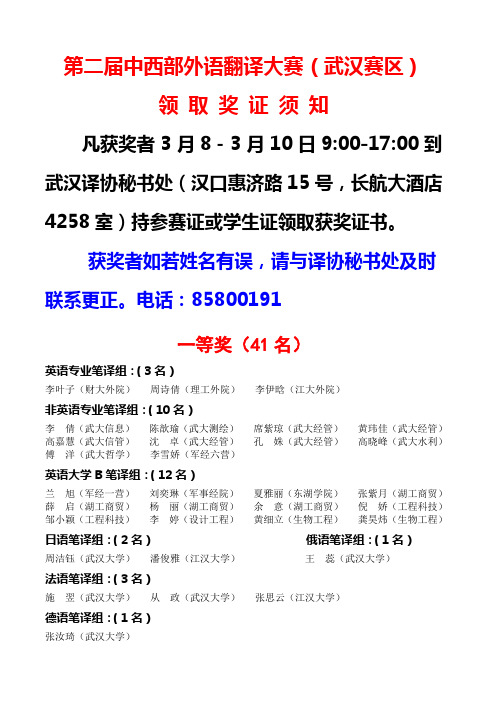
第二届中西部外语翻译大赛(武汉赛区)领取奖证须知凡获奖者3月8-3月10日9:00-17:00到武汉译协秘书处(汉口惠济路15号,长航大酒店4258室)持参赛证或学生证领取获奖证书。
获奖者如若姓名有误,请与译协秘书处及时联系更正。
电话:85800191一等奖(41名)英语专业笔译组:(3名)李叶子(财大外院)周诗倩(理工外院)李伊晗(江大外院)非英语专业笔译组:(10名)李倩(武大信息)陈歆瑜(武大测绘)席紫琼(武大经管)黄玮佳(武大经管)高嘉慧(武大信管)沈卓(武大经管)孔姝(武大经管)高晓峰(武大水利)傅洋(武大哲学)李雪娇(军经六营)英语大学B笔译组:(12名)兰旭(军经一营)刘奕琳(军事经院)夏雅丽(东湖学院)张紫月(湖工商贸)薛启(湖工商贸)杨丽(湖工商贸)余意(湖工商贸)倪娇(工程科技)邹小颖(工程科技)李婷(设计工程)黄细立(生物工程)龚昊炜(生物工程)日语笔译组:(2名)俄语笔译组:(1名)周洁钰(武汉大学)潘俊雅(江汉大学)王蕊(武汉大学)法语笔译组:(3名)施翌(武汉大学)从政(武汉大学)张思云(江汉大学)德语笔译组:(1名)张汝琦(武汉大学)英语专业口译组:(1名)夏梦(江大外院)非英语专业口译组:(4名)陈梦玄(武大经管)王欣颖(武大经管)苗冰蕊(军经二研)闫昊(军经二营)英语大学B口译组:(3名)林子武(军经四营)宋相颖(东湖学院)刘畅(工程科技)二等奖(116名)英语专业笔译组:(17名)李雪莹(武大外院)刘潇文(理工外院)杨淑(江大外院)熊明(江大外院)王剑力(江大外院)俞盼(江大外院)刘思颖(江大外院)孙诗帆(江大外院)计皓喆(江大外院)段朝霞(工程科技)金紫洁(湖工商贸)姚金艳(财税职院)袁浩(生物工程)杨紫林(生物工程)方媛媛(晴川学院)张语嫣(晴川学院)李梦婕(晴川学院)非英语专业笔译组:(23名)王颀颖(武大经管)戴春齐(武大测绘)陈秀颖(武大计算)汤雅倩(武大国软)潘昱竹(武大经管)邓雨琛(武大遥感)熊庭嘉(武大经管)耿洁如(武大经管)李昂(武大资源)杨陈(武汉大学)杨梦薇(武大水利)陈奕锦(武大水利)向梦(武大水利)洪颖(武大法学)陈泳儒(武大电子)刘千(武大经管)周洲(武大资环)王晓菲(武大药学)王若茜(武大口腔)姜卓君(武大遥感)郭良靓(武大信管)蒋博文(军经二营)英语大学B笔译组:(40名)吕得超(军经四营)朱小娟(军经一营)胡思颖(军经一连)王鹤桥(军经二营)王汝成(东湖学院)朱文进(东湖学院)吴子薇(东湖学院)邵玥(东湖学院)胡梅(东湖学院)朱婧昳(东湖学院)张樱译(东湖学院)汪思静(东湖学院)占立(东湖学院)商倩(东湖学院)王书琴(东湖学院)居小熙(湖工商贸)周三思(湖工商贸)宋佳瑛(湖工商贸)冯紫嫣(湖工商贸)陈定娟(湖工商贸)雷宇(湖工商贸)管君妍(湖工商贸)颜梦莹(湖工商贸)李辉(工程科技)龙莹(工程科技)李翠(工程科技)牟倩(工程科技)毛雨(工程科技)胡璐瑶(工程科技)刘思琦(工程科技)曾庆林(工程科技)杨冰昕(工程科技)蔡梦雅(设计工程)钱静(设计工程)魏瑶(设计工程)郭洁(设计工程)张扬星(设计工程)胡雅(设计工程)李春燕(生物工程)程艳(生物工程)日语笔译组:(4名)黄羽茜(武汉大学)杨璐瑶(武汉大学)吴炼(江汉大学)彭媛(江汉大学)法语笔译组:(5名)刘艺童(武汉大学)李卓耘(武汉大学)周昕(武汉大学)曾凡冬(武汉大学)杨晨辰(江汉大学)德语笔译组:(2名)俄语笔译组:(1名)袁芳(武汉大学)肖卫焕(武汉大学)英语专业口译组:(1名)宋宏锦(江大外院)非英语专业口译组:(9名)潘昱竹(武大经管)钟炜乐(武大印刷)李丽晴(武大经管)庄莹(武大资环)江宇轩(武大法学)陈秀颖(武大计院)杨燕隽(军经五营)刘晓菁(江大语言)蒋易睿(江大商院)英语大学B口译组:(6名)郭文骏(军经一队)邹楠(军事经院)金琦(东湖学院)徐婧雯(工程科技)郑欣(工程科技)薜启(湖工商贸)三等奖(265名)英语专业笔译组:(33名)王燕(财大外院)罗佳雯(理工外院)丁妍玉(江大外院)李梦利(江大外院)潘婉莹(江大外院)洪蓓(江大外院)石蕾(江大外院)陈梦婷(江大外院)乐鑫(江大外院)李容(工程科技)李传蓉(工程科技)明梦(工程科技)施慧君(工程科技)余雪晴(工程科技)刘小双(工程科技)熊文倩(工程科技)张月(工程科技)罗晖(设计工程)张罕(设计工程)王周硕(生物工程)曹钦瑶(生物工程)戴霓(生物工程)钟典(生物工程)李俊渊(生物工程)肖娜(生物工程)余祥(生物工程)明星(生物工程)曾欢(晴川学院)李健威(晴川学院)邓欢欢(晴川学院)吕惠敏(晴川学院)胡婷婷(晴川学院)汪盼盼(晴川学院)非英语专业笔译组:(74名)许玥(武大口腔)吴越昊(武大经管)王英珍(武大经管)赵诗雅(武大资环)汪鹏程(武大国软)李婷婷(武大口腔)崔璨(武大经管)邹聪(武大遥感)齐子萱(武大经管)卢佳慧(武大经管)彭硕(武大法学)郭飞扬(武大口腔)魏芙盈(武大经管)熊雪卉(武大法学)陈怡兴(武大信息)李雅静(武大资环)孙文祥(武大国软)刘佳鹏(武大动力)梁韵婷(武大测绘)张誉靓(武大水利)吴晓岚(武大口腔)吴晓欣(武大电气)陈婕(武大金融)孟湘(武大动力)熊念慧(武大文院)蒋浩泉(武大测绘)周慕哲(武大国软)尹石鸣(武大动机)衡倩(武大信管)倪苗晨(武大电气)李俊(武大资环)贾钰麒(武大水利)郑凌云(武大经管)郑恒杰(武大国软)张弘(武大信管)邵子成(武大测绘)张婧(武大经管)游琪(武大国软)李相锋(武大水利)袁蔚(武大水利)沈王政(武大资环)陈昱璇(武大经管)陈若雨(武大文院)周缘圆(武大国软)何沁心(武大文院)刘泽妮(武大口腔)曾奕(武大信管)黄嫆蓝(武大水利)邓锦瑟(武大法学)邓撼族(武大经管)白涛(武大遥感)李书婧(财大法学)聂枭镒(理工经济)严子涵(军经六营)蔡金妤(军经六营)许佳恩(军经三营)黄挺哲(军事经院)林思思(军经五营)郝祯蕊(军经审计)苗冰蕊(军经二研)张梓晗(军经五营)朱依迪(军经二营)陈依容(军经审计)李语佳(军经五营)闫昊(军事经院)任家港(军经三营)陶冰清(江大工商)孙婧(江大会计)王超(江大机电)陈妍(江大法学)左倩倩(江大会计)李家雯(江大会计)付雨桐(江大金融)丁嘉达(设计工程)英语大学B笔译组:(94名)胡峻菘(军经一营)宋锦锦(军事经院)梁宪帅(军事经院)仝坤朋(军事经院)许炜昊(军经六营)汤泽志(军经二营)程果(军经四营)成适(军经四营)许可(军经一营)潘源鑫(军经六营)黄文韬(军经六营)王颖妍(东湖学院)宋相颖(东湖学院)彭露(东湖学院)杨晓琴(东湖学院)黄文静(东湖学院)陈倩(东湖学院)张娟(东湖学院)周祖越(东湖学院)詹思齐(东湖学院)李悦媛(东湖学院)程方(东湖学院)杨雅娣(东湖学院)李艺(东湖学院)付洁(东湖学院)郑文君(东湖学院)朱晓港(东湖学院)刘丁燊(东湖学院)张凤月(东湖学院)张颂(东湖学院)肖蕾(东湖学院)王红(湖工商贸)张琴(湖工商贸)郭强(湖工商贸)金嘉豪(湖工商贸)汪德泓(湖工商贸)刘红柳(湖工商贸)方梦怡(湖工商贸)王思娟(湖工商贸)邱昊天(湖工商贸)邹昕汝(湖工商贸)余静萱(湖工商贸)罗梦玲(湖工商贸)袁晓(湖工商贸)云诗颀(湖工商贸)陈燕(湖工商贸)陈兴玮(湖工商贸)熊忠慧(湖工商贸)傅雨杰(湖工商贸)龚婷冉(湖工商贸)张诗珍(湖工商贸)李欢(湖工商贸)高江波(工程科技)陈佰圆(工程科技)孟凡(工程科技)黄栎明(工程科技)刘礼欣(工程科技)陈玉(工程科技)向江莉(工程科技)吴青松(工程科技)张宏叶(工程科技)田秋蓝(工程科技)鲁文迪(工程科技)徐梦诗(工程科技)杨颖(工程科技)汪嘉璇(工程科技)赖雨倩(工程科技)张玲(工程科技)蔡晓丹(工程科技)张巧丽(设计工程)胡钰(设计工程)叶海清(设计工程)刘煜(设计工程)杨紫薇(设计工程)张莹莹(设计工程)兰彬(设计工程)任露(设计工程)张倩(设计工程)李艳玲(设计工程)黄鸿涛(设计工程)邵晓凡(设计工程)邹青青(设计工程)李媛媛(设计工程)李慧(设计工程)王淑婷(设计工程)倪邦霞(设计工程)彭婉君(生物工程)袁婧(生物工程)张丁贝(晴川学院)余宽(晴川学院)孟醒(晴川学院)吴琼(工程职院)王杰(工程职院)袁昱昊(工程职院)日语笔译组:(18名)杜伟(武汉大学)夏庄璐(武汉大学)张琨松(武汉大学)廖泽宇(武汉大学)王思元(武汉大学)李玲(武汉大学)国锐(武汉大学)杨米娅(武汉大学)贺晨(武汉大学)钟苗苗(江汉大学)马颖(江汉大学)李培(江汉大学)李紫依(江汉大学)陈世善(江汉大学)周晨萱(江汉大学)袁雅婷(江汉大学)刘斯琨(江汉大学)张馨月(江汉大学)法语笔译组:(9名)李慕贤(武汉大学)郝念东(武汉大学)陈柳(武汉大学)李戈锐(武汉大学)张亦超(武汉大学)王梓佩(武汉大学)陆佳怡(江汉大学)曹卉(江汉大学)苏慧婷(江汉大学)德语笔译组:(2名)俄语笔译组:(2名)韩弦君(武汉大学)高政(武汉大学)邹运(武汉大学)陈杭程(武汉大学)英语专业口译组:(3名)陈梅(江大外院)岳佳奇(江大外院)黄欣(晴川学院)非英语专业口译组:(18名)刘齐凯(武大信息)王浩哲(武大计算)高蒙迪(武大资环)王蕾(武大经管)姜卓君(武大遥感)卢佳慧(武大经管)吴晓岚(武大口腔)郭容辰(武大文学)许瑶冰(武大计算)郑婕(武大经管)周璟(武大信息)杨珈玮(武大社会)赵慧佳(武大基础)洪颖菲(武大信息)冯蔚杉(武大哲学)熊泽印(军经六营)孙伟哲(军经六营)杜燚博(军经二营)英语大学B口译组:(12名)淘泽志(军经二营)黄萌(军经财务)袁铭昶(军事经院)王瑜(军经五营)叶天强(东湖学院)倪秋月(东湖学院)向玲莉(东湖学院)杨燕雯(东湖学院)夏雅丽(东湖学院)郭琳娜(工程科技)罗曼(设计工程)吕梦琪(设计工程)优秀奖(343名)英语专业笔译组:(28名)杨晶晶(江大外院)任艳芳(江大外院)刘畅(工程科技)高晓萱(工程科技)杨蕾(工程科技)曾瑶瑶(工程科技)吴斐(工程科技)金婷(工程科技)金阳(工程科技)王俊文(工程科技)游芸芸(工程科技)胡梦锦(工程科技)陈欣瑜(工程科技)曹雅倩(设计工程)许畅(生物工程)田平平(生物工程)周贝(生物工程)罗格(生物工程)许芳宁(生物工程)李悦(生物工程)王秋(生物工程)姚兰(生物工程)廖晓玲(生物工程)朱思思(生物工程)宋诗芳(生物工程)王仕杰(生物工程)吴李娜(晴川学院)罗红豆(晴川学院)张芸(晴川学院)非英语专业笔译组:(123名)刘瑛(武大经管)李思源(武大法学)吴楚莹(武大经管)李朝钦(武大电气)石夙彤(武大法学)余樯(武大水利)李婧姝(武大人文)刘文瑶(武大汉语)马申娟(武大经管)王艺璇(武大法学)余琳(武大电子)范文清(武大基础)董泽华(武大基础)谭安然(武大健康)游媛(武大口腔)袁敏彦(武大口腔)赵烨(武大水利)余俊驰(武大电气)沈婧(武大城计)叶雨柯(武大水利)万梦圆(武大国软)孙满(武大经管)武艺杰(武大资环)张臣磊(武大经管)黄佳晟(武大水利)王永强(武大经管)王营营(武大资环)吕雨薇(武大水院)庞雪姣(武大计算)杨阳(武大二临)吴意蕴(武大文学)蒋婧文(武大基础)崔家铭(武大经管)王晓晗(武大经管)王璟(武大资环)冯蔚杉(武大哲学)王蕾(武大经管)梁爽(武大二临)王宇航(武大经管)田曦冉(武大动机)赵慧佳(武大基础)李芷薇(武大经管)吴依楠(武大经管)陈佳锋(武大基础)付益慧(武大口腔)徐榕榕(武大法学)王艺霖(武大经管)何雨情(武大测绘)杨思益(武大法学)郭陶(武大基础)鄢宇婷(武大经管)洪宇(武大电气)何雯菁(武大经管)马颖政(武大动机)黄佳伊(武大经管)罗文杰(武大经管)颜然(武大口腔)张澍树(武大文学)张榆钧(武大法学)唐文仪(武汉大学)刘晓婷(武大国软)曾越(武大口腔)王浩雄(武大水利)杨金鑫(武大电气)陈嘉民(武大水利)欧阳特(武大水利)常一铭(武大水利)王雨田(武大经管)梁蕾庭(武大法学)周璟(武大信息)周思尧(武大国软)华雨(武大经管)连泰棋(武大水利)庄紫瑶(武大口腔)沈雪洁(武大文学)谭一航(武大经管)许敏章(武大基础)张运加(武大计算)李昊天(武大电气)林森(武大法学)罗阳(武大经管)黄德裕(武大电气)汪君(武大法学)张哲熙(武大国软)岳翔(武大国软)朱碧莹(武大水利)赵亮宇(理工大学)邱语嫣(理工工艺)陈超(军经财务)林师楠(军经财务)王一鸣(军经五营)邹亿(军经三营)孙伟哲(军事经院)赵坤(军经六营)杜燚博(军经二营)张浩楠(军经二营)柳岸青(军经三队)梁安心(军经五营)雷雅鑫(军事经院)王超(军经六营)张博雨(军经装备)缑林昊(军事经院)温涛(军经三队)唐俊林(军经五营)张浩庆(军经装备)张雨翊(军经战勤)唐鸿远(军经四营)刘健民(军经五营)黄阔(军经二营)彭国锋(军经装备)叶渭(军事经院)潘致蘅(军经三营)熊泽印(军经审计)赵诗源(江大计算)杨雪婧(江大临床)张程(江大工管)陈宇娜(江大会计)钟天(江大化环)吴宏辉(江大人文)张玉水(江大工管)邓竞彦(江大国贸)黄思鸣(江大机建)曾相涵(设计工程)英语大学B笔译组:(123名)王程程(军经六营)姜叶乘(军经四营)董雪琳(军事经院)周毅诚(军经二营)赵栋(军事经院)刘志远(军经一营)陈春明(军经四营)王沛文(军经一营)王晓航(军经四营)展翔(军经二连)王一夫(军经一营)李晓杰(军经六营)何智民(军经二营)赵星(军经二营)张梦(军经五营)王钦湄(军经五营)余铭健(军经一班)赵萱(军经一营)况维斌(军经二营)周杰(东湖学院)徐琴(东湖学院)王清清(东湖学院)答琳丽(东湖学院)王彬宾(东湖学院)普乐(东湖学院)张敏(东湖学院)黄律聪(东湖学院)万栖玲(东湖学院)李娟(东湖学院)贺王莹(东湖学院)何伟玲(东湖学院)杨燕雯(东湖学院)魏梦茜(东湖学院)兰航(东湖学院)万梅(东湖学院)张琪(东湖学院)张子晗(东湖学院)金琦(东湖学院)刘承(东湖学院)杜宇(东湖学院)马世臣(东湖学院)彭诗雨(东湖学院)王佩(东湖学院)陈铮钊(东湖学院)章贝思(东湖学院)周雨(东湖学院)段紫妍(东湖学院)顾金泉(东湖学院)胡悦(东湖学院)范佳(东湖学院)阮雪梅(东湖学院)王依婷(东湖学院)梁思桐(东湖学院)张杨敏(东湖学院)李璐思(东湖学院)肖孟竹(湖工商贸)姚在妍(湖工商贸)李冬(湖工商贸)詹素(湖工商贸)牛婧婕(湖工商贸)魏婷婷(湖工商贸)廖娅婷(湖工商贸)梅绵洁(湖工商贸)费灿婷(湖工商贸)张婧茹(湖工商贸)贺雨丹(湖工商贸)邓梦婕(湖工商贸)郭壮(湖工商贸)徐欢(湖工商贸)汤晓雨(湖工商贸)曹俊哲(湖工商贸)季节(湖工商贸)徐小凯(湖工商贸)许愿(湖工商贸)李思哲(湖工商贸)丁江雪(湖工商贸)吴昊(湖工商贸)丁玲(湖工商贸)冯清华(湖工商贸)沈茜(工程科技)李可盈(工程科技)宋远鹏(工程科技)李悦(工程科技)张功铭(工程科技)武映茹(工程科技)冯凌云(工程科技)陈雨婷(工程科技)郭紫芳(工程科技)张雨婷(工程科技)杨华(工程科技)任艳琴(工程科技)张迅(工程科技)车真真(工程科技)邓叶(工程科技)张驰(工程科技)王可欣(工程科技)熊粤宁(工程科技)胡思琪(工程科技)张寒钰(工程科技)帅梦颖(设计工程)黄钰童(设计工程)张娇(设计工程)王琪媛(设计工程)帅成竹(设计工程)胡惠婷(设计工程)吴建军(设计工程)邹可(设计工程)刘雪冰(设计工程)胡慧颖(设计工程)叶凡威(生物工程)吕敏钊(生物工程)李嘉颖(生物工程)李迪龙(生物工程)何洋(生物工程)李灯钰(生物工程)曾理(晴川学院)姬成(晴川学院)任航(晴川学院)张圆圆(工程职院)黄紫洋(工程职院)谭苗(工程职院)黄博文(工程职院)日语笔译组:(13名)许玉颖(武汉大学)俞丽霞(武汉大学)任雪铭(江汉大学)孙佳丽(江汉大学)丁芸(江汉大学)罗灏(江汉大学)叶陈汝娜(江汉大学)高雨(江汉大学)吴洋(江汉大学)陈雅馨(工程科技)周阳(生物工程)冯梦玲(生物工程)李俊(生物工程)法语笔译组:(14名)陈婧茜(江汉大学)黄李梦(江汉大学)张湮琪(江汉大学)管青(江汉大学)汪小琦(江汉大学)黎芳芳(江汉大学)邓安婕(江汉大学)芦雅馨(江汉大学)吴思千(江汉大学)桂恒(江汉大学)李雨薇(江汉大学)邹明君(江汉大学)吴丝雨(江汉大学)许畅(江汉大学)德语笔译组:(2名)俄语笔译组:(1名)熊平(武汉大学)赵亚玲(武汉大学)谭静(武汉大学)英语专业口译组:(5名)方慧怡(江大外院)孙诗帆(江大外院)潘婉莹(江大外院)曾瑶瑶(工程科技)吴苗(工程科技)非英语专业口译组:(22名)袁蔚(武大水利)宋纯楚(武大信息)蒋浩泉(武大测绘)李昂(武大资环)饶婧(武大资环)余琳(武大电子)吴意蕴(武大文学)洪艺(武大遥感)韩新娟(武大测绘)胡沿轩(军经审计)邹高俊(军经六营)郝祯蕊(军经一排)陈依容(军经六营)孙宁(军经财物)丁悦智(军事经院)伍文昊(军经审计)杨尚直(军事经院)王文圻(军事经院)王鑫(军经学员)陈超(军经财务)江阳(江大商院)曾容(江大设计)英语大学B口译组:(12名)周加镕(军经装备)成适(军经四营)王焱(军经六营)王衎森(军事经院)陈康宁(军经财务)兰旭(军事经院)吴奇镝(军经装备)邹茹双(东湖学院)江汤(设计工程)王靖蕊(设计工程)云诗颀(湖工商贸)孟醒(晴川学院)。
演讲词

(比赛前,主持人在幕后提醒:比赛即将开始,为了保证比赛的顺利进行,请您将您的手机处于关闭状态,谢谢合作!)X:Good afternoon , ladies and gentlemen! Welcome to English Speaking Competition.Y:尊敬的各位领导,各位来宾,亲爱的老师们,同学们,大家好!欢迎来到中南民族大学第二届英语演讲比赛决赛现场。
X: This Competition is undertaken by Foreign Language Department. In today's Grand Final there24 finalists; they are all the winners of the preliminaries. Some know that today will be a very rigorous competition.Y:本次大赛由外语系主办。
今天参加决赛的24位选手将给我们带来精彩的比赛。
X:Firstly, let's introduce today's honorable leader and judges and guests. I have the great privilege of presenting today's judges for this Speech Contest. LiuZuohuan ,the professor, of English Department, ChengXingwu, Our judgers , Majie-Vice director of English Department ,HouHuili, XuYi, TangDandan , Zhangwei . WangZhong—question master------------------------------Y:光临今天大赛现场的领导和嘉宾是:刘作焕——外语系教授,陈兴无---外语系大英部副主任。
11月翻译资格考题二级英语笔译实务试卷及答案

11月翻译资格考题二级英语笔译实务试卷及答案第一部分英译汉必译题This week and next, governments, international agencies and nongovernmental organizations are gathering in Mexico City at the World Water Forum to discuss the legacy of global Mulhollandism in water - and to chart a new course.They could hardly have chosen a better location. Water is being pumped out of the aquifer on which Mexico City stands at twice the rate of replenishment. The result: the city is subsiding at the rate of about half a meter every decade. You can see the consequences in the cracked cathedrals, the tilting Palace of Arts and the broken water and sewerage pipes.Every region of the world has its own variant of the water crisis story. The mining of groundwaters for irrigation has lowered the water table in parts of India and Pakistan by 30 meters in the past three decades. As water goes down, the cost of pumping goes up, undermining the livelihoods of poor farmers.What is driving the global water crisis? Physical availability is part of the problem. Unlike oil or coal, water is an infinitely renewable resource, but it is available in a finite quantity. With water use increasing at twice the rate of population growth, the amount available per person is shrinking - especially in some of the poorest countries.Challenging as physical scarcity may be in some countries, the real problems in water go deeper. The 20th-century model for water management was based on a simple idea: that water is an infinitely available free resource to be exploited, dammed or diverted without reference to scarcity or sustainability.Across the world, water-based ecological systems - rivers, lakes and watersheds - have been taken beyond the frontiers of ecological sustainability by policy makers who have turned a blind eye to the consequences of over- exploitation.We need a new model of water management for the 21st century. What does that mean? For starters, we have to stop using water like there"s no tomorrow - and that means using it more efficiently at levels that do not destroy our environment. The buzz- phrase at the Mexico Water forum is "integrated water resource management." What it means is that governments need to manage the private demand of different users and manage this precious resource in the public interest.参照译文:本周,世界水论坛在墨西哥城开幕,论坛将一直持续到下周。
第二届英语世界杯翻译大赛原文
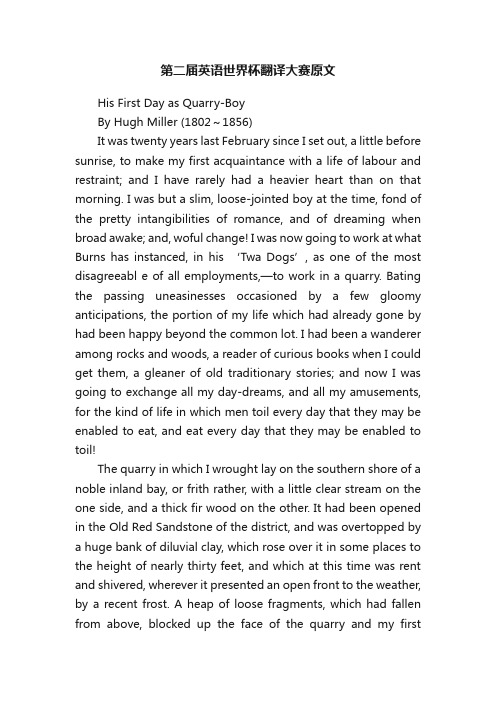
第二届英语世界杯翻译大赛原文His First Day as Quarry-BoyBy Hugh Miller (1802~1856)It was twenty years last February since I set out, a little before sunrise, to make my first acquaintance with a life of labour and restraint; and I have rarely had a heavier heart than on that morning. I was but a slim, loose-jointed boy at the time, fond of the pretty intangibilities of romance, and of dreaming when broad awake; and, woful change! I was now going to work at what Burns has instanced, in his ‘Twa Dogs’, as one of the most disagreeabl e of all employments,—to work in a quarry. Bating the passing uneasinesses occasioned by a few gloomy anticipations, the portion of my life which had already gone by had been happy beyond the common lot. I had been a wanderer among rocks and woods, a reader of curious books when I could get them, a gleaner of old traditionary stories; and now I was going to exchange all my day-dreams, and all my amusements, for the kind of life in which men toil every day that they may be enabled to eat, and eat every day that they may be enabled to toil!The quarry in which I wrought lay on the southern shore of a noble inland bay, or frith rather, with a little clear stream on the one side, and a thick fir wood on the other. It had been opened in the Old Red Sandstone of the district, and was overtopped by a huge bank of diluvial clay, which rose over it in some places to the height of nearly thirty feet, and which at this time was rent and shivered, wherever it presented an open front to the weather, by a recent frost. A heap of loose fragments, which had fallen from above, blocked up the face of the quarry and my firstemployment was to clear them away. The friction of the shovel soon blistered my hands, but the pain was by no means very severe, and I wrought hard and willingly, that I might see how the huge strata below, which presented so firm and unbroken a frontage, were to be torn up and removed. Picks, and wedges, and levers, were applied by my brother-workmen; and, simple and rude as I had been accustomed to regard these implements, I found I had much to learn in the way of using them. They all proved inefficient, however, and the workmen had to bore into one of the inferior strata, and employ gunpowder. The process was new to me, and I deemed it a highly amusing one: it had the merit, too, of being attended with some such degree of danger as a boating or rock excursion, and had thus an interest independent of its novelty. We had a few capital shots: the fragments flew in every direction; and an immense mass of the diluvium came toppling down, bearing with it two dead birds, that in a recent storm had crept into one of the deeper fissures, to die in the shelter. I felt a new interest in examining them. The one was a pretty cock goldfinch, with its hood of vermilion and its wings inlaid with the gold to which it owes its name, as unsoiled and smooth as if it had been preserved for a museum. The other, a somewhat rarer bird, of the woodpecker tribe, was variegated with light blue and a grayish yellow. I was engaged in admiring the poor little things, more disposed to be sentimental, perhaps, than if I had been ten years older, and thinking of the contrast between the warmth and jollity of their green summer haunts, and the cold and darkness of their last retreat, when I heard our employer bidding the workmen lay by their tools. I looked up and saw the sun sinking behind the thick fir wood beside us, and the long dark shadows of the trees stretchingdownward towards the shore.—Old Red Sandstone(文章选自THE OXFORD BOOK OF ENGLISH PROSE, 658-660, Oxford University Press, London, first published 1925,reprinted 1958.)。
2020中译国青杯英译汉原文
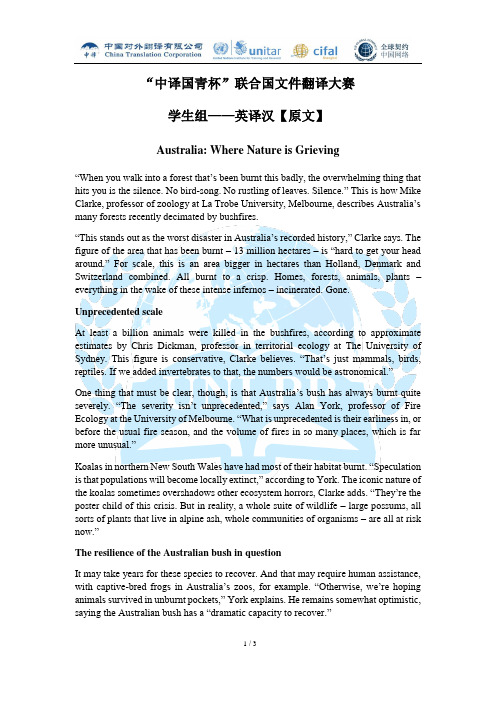
“中译国青杯”联合国文件翻译大赛学生组——英译汉【原文】Australia: Where Nature is Grieving“When you walk into a forest that’s been burnt this badly, the overwhelming thing that hits you is the silence. No bird-song. No rus tling of leaves. Silence.” This is how Mike Clarke, professor of zoology at La Trobe University, Melbourne, describes Australia’s many forests recently decimated by bushfires.“This stands out as the worst disaster in Australia’s recorded history,” Clarke says. The figure of the area that has been burnt – 13 million hectares –is “hard to get your head around.” For scale, this is an area bigger in hectares than Holland, Denmark and Switzerland combined. All burnt to a crisp. Homes, forests, animals, plants –everything in the wake of these intense infernos – incinerated. Gone.Unprecedented scaleAt least a billion animals were killed in the bushfires, according to approximate estimates by Chris Dickman, professor in territorial ecology at The University of Sydney. This figure is conservative, Clarke believes. “That’s just mammals, birds, reptiles. If we added invertebrates to that, the numbers would be astronomical.”One thing that must be clear, though, is that Australia’s bush has always burnt quite s everely. “The severity isn’t unprecedented,” says Alan York, professor of Fire Ecology at the University of Melbourne. “What is unprecedented is their earliness in, or before the usual fire season, and the volume of fires in so many places, which is far mo re unusual.”Koalas in northern New South Wales have had most of their habitat burnt. “Speculation is that populations will become locally extinct,” according to York. The iconic nature of the koalas sometimes overshadows other ecosystem horrors, Clarke ad ds. “They’re the poster child of this crisis. But in reality, a whole suite of wildlife – large possums, all sorts of plants that live in alpine ash, whole communities of organisms – are all at risk now.”The resilience of the Australian bush in questionIt may take years for these species to recover. And that may require human assistance, with captive-bred frogs in Australia’s zoos, for example. “Otherwise, we’re hoping animals survived in unburnt pockets,” York explains. He remains somewhat optimistic, s aying the Australian bush has a “dramatic capacity to recover.”There are, however, caveats. Rainforests and alpine areas of Tasmania, for instance, don’t have much experience of fires, so they’re more vulnerable to repeated fires, he says. And under the current climate change model, increasing fires are inevitable.Some of several “human interferences” that’ll most likely hamper recovery include habitat removal from land clearing; introducing feral species which prey on native species (feral cats have been known to come from ten kilometres away to the edge of a fire to pick off prey, usually native); and a lack of urgent political action on climate change.The problem is, lots of critical resources have been incinerated. For example, many fauna – cockatoos, parrots, possums, bats – rely on hollow logs on the ground, or on trees to den in or breed in. Not only have those logs now gone, Clarke predicts that it will take one to two centuries for them to appear again, hollowed out. “A lot of Australian wood is hardwood. Fungi and termites hollow it really slowly. There are no woodpeckers here,” he explains. Suddenly, the capacity to recover seems almost insurmountable within our lifetime. “What could disappear in hours in bushfire could take centuries to replace. Ecologists would call this a ‘complete state change’.”Immediate measures neededExperts say some immediate steps are being taken to help along the recovery of this vast area. A moratorium on logging has been proposed, and pressure is building to act more aggressively on the pest control of feral cats and foxes, in addition to introducing weed removal. “Weeds recolonize areas disturbed by fire. They use resources that native plants and animals might need,” York explains.Identifying and protecting areas that did not burn is also an important subject for debate. Specifically, some are arguing that cultural burns may be better than the hotter, more intense, hazard reduction burning. Cultural burns are cool-burning, knee-high blazes that were designed to happen continuously and across the landscape, practised by indigenous people long before Australia’s invasion and colonization. The fires burn up fuel like kindling and leaf detritus, so that a natural bushfire has less to devour.Since Australia's fire crisis began last year, calls for better reintegration of this technique have grown louder. But they may be of limited value at this crisis point, according to Clarke. “We need to appreciate how different things are now. Cultural burns happened to enable people to move through dense vegetation easily, or for ceremonial reasons. They weren’t burning around 25 million people, criss-crossed by complex infrastructure and in a climate change scenario,” he estimates.Concrete measures to combat climate change are indeed crucial for the future of biodiversity. In spite of green shoots of optimism in some quarters, the prognosis of whether the bush will ever recover its biodiversity is looking somewhat grim. Breaking it down, Clarke surmises that “A chunk of it will be good – a third will be able to bounce back. A third is in question, but a third is in serious trouble. I’ve been studyingfire ecology for twenty years, but we’re de aling with unchartered territory changing before our eyes.”【参赛译文格式要求】一、参赛译文应为Word文档.doc或.docx格式。
英语口译实务二级
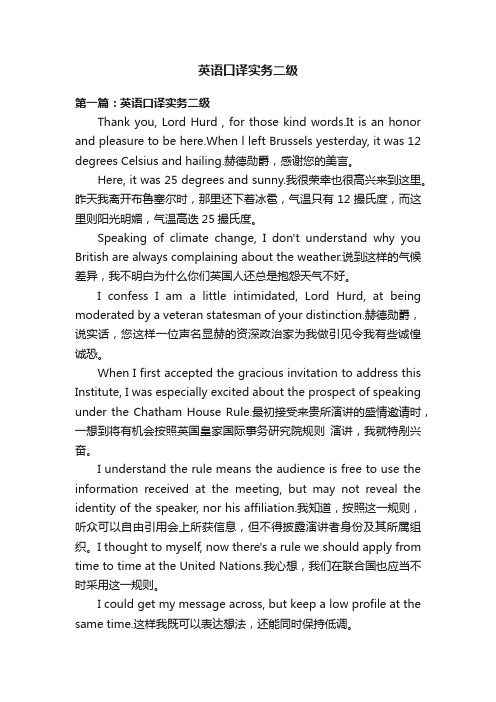
英语口译实务二级第一篇:英语口译实务二级Thank you, Lord Hurd , for those kind words.It is an honor and pleasure to be here.When l left Brussels yesterday, it was 12 degrees Celsius and hailing.赫德勋爵,感谢您的美言。
Here, it was 25 degrees and sunny.我很荣幸也很高兴来到这里。
昨天我离开布鲁塞尔时,那里还下着冰雹,气温只有12撮氏度,而这里则阳光明媚,气温高迭25撮氏度。
Speaking of climate change, I don't understand why you British are always complaining about the weather.说到这样的气候差异,我不明白为什么你们英国人还总是抱怨天气不好。
I confess I am a little intimidated, Lord Hurd, at being moderated by a veteran statesman of your distinction.赫德勋爵,说实话,您这样一位声名显赫的资深政治家为我做引见令我有些诚惶诚恐。
When I first accepted the gracious invitation to address this Institute, I was especially excited about the prospect of speaking under the Chatham House Rule.最初接受来贵所演讲的盛情邀请时,一想到将有机会按照英国皇家国际事务研究院规则演讲,我就特剐兴奋。
I understand the rule means the audience is free to use the information received at the meeting, but may not reveal the identity of the speaker, nor his affiliation.我知道,按照这一规则,听众可以自由引用会上所获信息,但不得披露演讲者身份及其所属组织。
2020中译国青杯英译汉原文

“中译国青杯”联合国文件翻译大赛学生组——英译汉【原文】Australia: Where Nature is Grieving“When you walk into a forest that’s been burnt this badly, the overwhelming thing that hits you is the silence. No bird-song. No rus tling of leaves. Silence.” This is how Mike Clarke, professor of zoology at La Trobe University, Melbourne, describes Australia’s many forests recently decimated by bushfires.“This stands out as the worst disaster in Australia’s recorded history,” Clarke says. The figure of the area that has been burnt – 13 million hectares –is “hard to get your head around.” For scale, this is an area bigger in hectares than Holland, Denmark and Switzerland combined. All burnt to a crisp. Homes, forests, animals, plants –everything in the wake of these intense infernos – incinerated. Gone.Unprecedented scaleAt least a billion animals were killed in the bushfires, according to approximate estimates by Chris Dickman, professor in territorial ecology at The University of Sydney. This figure is conservative, Clarke believes. “That’s just mammals, birds, reptiles. If we added invertebrates to that, the numbers would be astronomical.”One thing that must be clear, though, is that Australia’s bush has always burnt quite s everely. “The severity isn’t unprecedented,” says Alan York, professor of Fire Ecology at the University of Melbourne. “What is unprecedented is their earliness in, or before the usual fire season, and the volume of fires in so many places, which is far mo re unusual.”Koalas in northern New South Wales have had most of their habitat burnt. “Speculation is that populations will become locally extinct,” according to York. The iconic nature of the koalas sometimes overshadows other ecosystem horrors, Clarke ad ds. “They’re the poster child of this crisis. But in reality, a whole suite of wildlife – large possums, all sorts of plants that live in alpine ash, whole communities of organisms – are all at risk now.”The resilience of the Australian bush in questionIt may take years for these species to recover. And that may require human assistance, with captive-bred frogs in Australia’s zoos, for example. “Otherwise, we’re hoping animals survived in unburnt pockets,” York explains. He remains somewhat optimistic, s aying the Australian bush has a “dramatic capacity to recover.”There are, however, caveats. Rainforests and alpine areas of Tasmania, for instance, don’t have much experience of fires, so they’re more vulnerable to repeated fires, he says. And under the current climate change model, increasing fires are inevitable.Some of several “human interferences” that’ll most likely hamper recovery include habitat removal from land clearing; introducing feral species which prey on native species (feral cats have been known to come from ten kilometres away to the edge of a fire to pick off prey, usually native); and a lack of urgent political action on climate change.The problem is, lots of critical resources have been incinerated. For example, many fauna – cockatoos, parrots, possums, bats – rely on hollow logs on the ground, or on trees to den in or breed in. Not only have those logs now gone, Clarke predicts that it will take one to two centuries for them to appear again, hollowed out. “A lot of Australian wood is hardwood. Fungi and termites hollow it really slowly. There are no woodpeckers here,” he explains. Suddenly, the capacity to recover seems almost insurmountable within our lifetime. “What could disappear in hours in bushfire could take centuries to replace. Ecologists would call this a ‘complete state change’.”Immediate measures neededExperts say some immediate steps are being taken to help along the recovery of this vast area. A moratorium on logging has been proposed, and pressure is building to act more aggressively on the pest control of feral cats and foxes, in addition to introducing weed removal. “Weeds recolonize areas disturbed by fire. They use resources that native plants and animals might need,” York explains.Identifying and protecting areas that did not burn is also an important subject for debate. Specifically, some are arguing that cultural burns may be better than the hotter, more intense, hazard reduction burning. Cultural burns are cool-burning, knee-high blazes that were designed to happen continuously and across the landscape, practised by indigenous people long before Australia’s invasion and colonization. The fires burn up fuel like kindling and leaf detritus, so that a natural bushfire has less to devour.Since Australia's fire crisis began last year, calls for better reintegration of this technique have grown louder. But they may be of limited value at this crisis point, according to Clarke. “We need to appreciate how different things are now. Cultural burns happened to enable people to move through dense vegetation easily, or for ceremonial reasons. They weren’t burning around 25 million people, criss-crossed by complex infrastructure and in a climate change scenario,” he estimates.Concrete measures to combat climate change are indeed crucial for the future of biodiversity. In spite of green shoots of optimism in some quarters, the prognosis of whether the bush will ever recover its biodiversity is looking somewhat grim. Breaking it down, Clarke surmises that “A chunk of it will be good – a third will be able to bounce back. A third is in question, but a third is in serious trouble. I’ve been studyingfire ecology for twenty years, but we’re de aling with unchartered territory changing before our eyes.”【参赛译文格式要求】一、参赛译文应为Word文档.doc或.docx格式。
中西部翻译大赛首届初赛笔译试题及答案
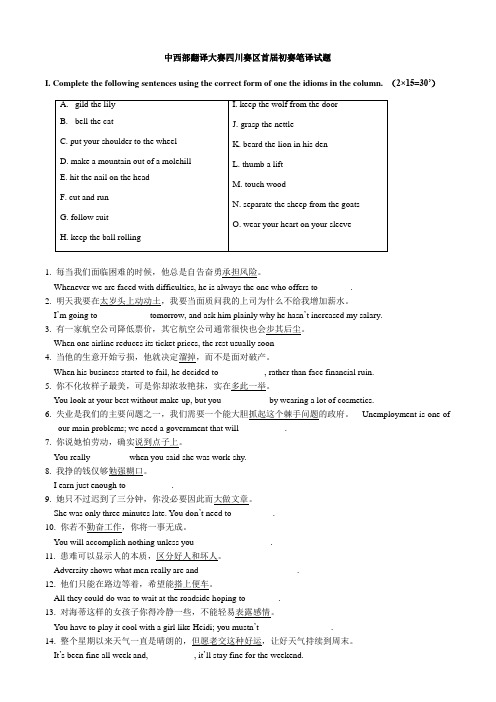
中西部翻译大赛四川赛区首届初赛笔译试题I. Complete the following sentences using the correct form of one the idioms in the column. (2×15=30’)1. 每当我们面临困难的时候,他总是自告奋勇承担风险。
Whenever we are faced with difficulties, he is always the one who offers to _______.2. 明天我要在太岁头上动动土,我要当面质问我的上司为什么不给我增加薪水。
I’m going to ___________ tomorrow, and ask him plainly why he hasn’t increased my salary.3. 有一家航空公司降低票价,其它航空公司通常很快也会步其后尘。
When one airline reduces its ticket prices, the rest usually soon _______4. 当他的生意开始亏损,他就决定溜掉,而不是面对破产。
When his business started to fail, he decided to __________, rather than face financial ruin.5. 你不化妆样子最美,可是你却浓妆艳抹,实在多此一举。
You look at your best without make-up, but you __________ by wearing a lot of cosmetics.6. 失业是我们的主要问题之一,我们需要一个能大胆抓起这个棘手问题的政府。
Unemployment is one ofour main problems; we need a government that will __________.7. 你说她怕劳动,确实说到点子上。
第二届ETTBL全国翻译大赛初赛笔译试题参考译文
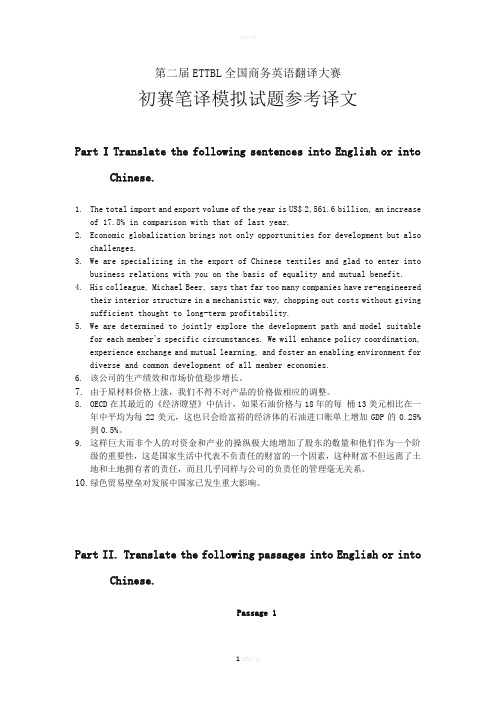
第二届ETTBL全国商务英语翻译大赛初赛笔译模拟试题参考译文Part I Translate the following sentences into English or into Chinese.1.The total import and export volume of the year is US$ 2,561.6 billion, an increaseof 17.8% in comparison with that of last year.2.Economic globalization brings not only opportunities for development but alsochallenges.3.We are specializing in the export of Chinese textiles and glad to enter intobusiness relations with you on the basis of equality and mutual benefit.4.His colleague, Michael Beer, says that far too many companies have re-engineeredtheir interior structure in a mechanistic way, chopping out costs without giving sufficient thought to long-term profitability.5.We are determined to jointly explore the development path and model suitablefor each member’s specific circumstances. We will enhance policy coordination, experience exchange and mutual learning, and foster an enabling environment for diverse and common development of all member economies.6.该公司的生产绩效和市场价值稳步增长。
翻译大赛试卷

考核方式:闭卷考试时间:120分钟第一题:汉译英15%1.市场需求_________________ market demand _________________________________2.社会主义市场经济______________________________________________3.可持续发展战略________________________________________________4.深化改革______________________________________________________5.人寿保险公司__________________________________________________6.综合国力______________________________________________________7.消费者物价指数_________________________________________________8.社会主义和谐社会_______________________________________________9.九年制义务教育__________________________________________________10.中国人民政治协商会议___________________________________________第二题:英译汉15%1. intellectual property rights_________________________________________2. Future Exchange_________________________________________________3. closing price_____________________________________________________4. loan and trust company____________________________________________5. extensive economy________________________________________________6. export quota _____________________________________________________7. Certified Public Accountant_________________________________________8. at sixes and sevens_________________________________________________9. cast pearls before the swine__________________________________________10. Scientific Outlook on Development___________________________________第三题:句子翻译 20%1.根据协议,所有的经济政策应该不加歧视地适用于所有人______________________________________________________________________ ______________________________________________________________________ 2.我们已争取到了政府强有力的支持,使公共场所吸烟成为违法行为。
第二届翻译大赛初赛题目及参考译文
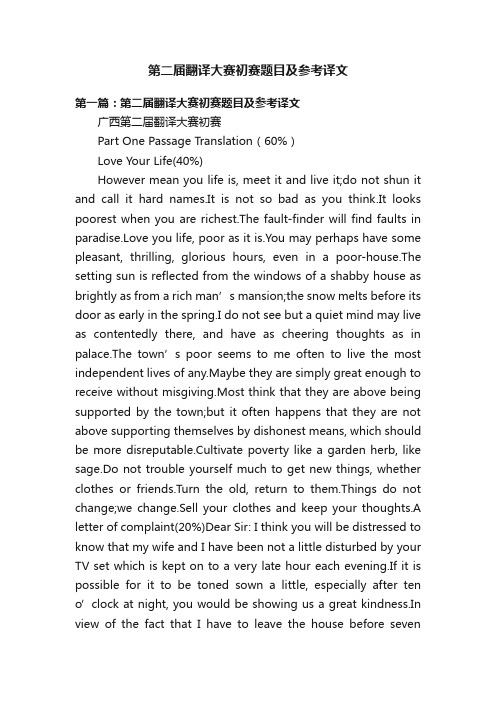
第二届翻译大赛初赛题目及参考译文第一篇:第二届翻译大赛初赛题目及参考译文广西第二届翻译大赛初赛Part One Passage Translation(60%)Love Your Life(40%)However mean you life is, meet it and live it;do not shun it and call it hard names.It is not so bad as you think.It looks poorest when you are richest.The fault-finder will find faults in paradise.Love you life, poor as it is.You may perhaps have some pleasant, thrilling, glorious hours, even in a poor-house.The setting sun is reflected from the windows of a shabby house as brightly as from a rich man’s mansion;the snow melts before its door as early in the spring.I do not see but a quiet mind may live as contentedly there, and have as cheering thoughts as in palace.The town’s poor seems to me often to live the most independent lives of any.Maybe they are simply great enough to receive without misgiving.Most think that they are above being supported by the town;but it often happens that they are not above supporting themselves by dishonest means, which should be more disreputable.Cultivate poverty like a garden herb, like sage.Do not trouble yourself much to get new things, whether clothes or friends.Turn the old, return to them.Things do not change;we change.Sell your clothes and keep your thoughts.A letter of complaint(20%)Dear Sir: I think you will be distressed to know that my wife and I have been not a little disturbed by your TV set which is kept on to a very late hour each evening.If it is possible for it to be toned sown a little, especially after ten o’clock at night, you would be showing us a great kindness.In view of the fact that I have to leave the house before seveno’clock in the morning, we are obliged to retire early to bed.I am sorry to raise the matter and I trust you will not consider me fussy or unneighborly in making the request.Part Two Sentence Translation(40%)1.2.3.4.无论科学发展得多快,海洋的形成仍是一个有待科学家解决的迷。
汤望姣全国英语作文二等奖

汤望姣全国英语作文二等奖(中英文实用版)Title: Tang Wang Jiao Wins Second Prize in National English Essay CompetitionTang Wang Jiao, a brilliant young writer, has recently been honored with the second prize in the prestigious National English Essay Competition.Her piece, a masterful blend of eloquence and insight, showcased her exceptional command of the English language and profound understanding of the topic at hand.标题:汤望姣荣获全国英语作文二等奖汤望姣,一位才华横溢的年轻作家,近日在全国英语作文大赛中荣获二等奖。
她的作品巧妙地融合了雄辩与洞察力,充分展示了她扎实的英语功底和对主题的深刻理解。
Distinguished by its unique perspective and innovative expression, her essay stood out among hundreds of entries, capturing the judges" attention and earning high praise.The competition, aimed at promoting English language proficiency and creative writing skills among Chinese students, has once again highlighted the outstanding talents in this field.其作品凭借独特的视角和创新的表达方式,在数百篇参赛作品中脱颖而出,吸引了评委们的目光,获得了高度评价。
中西部翻译大赛第二届英语专业组初赛笔译题及答案
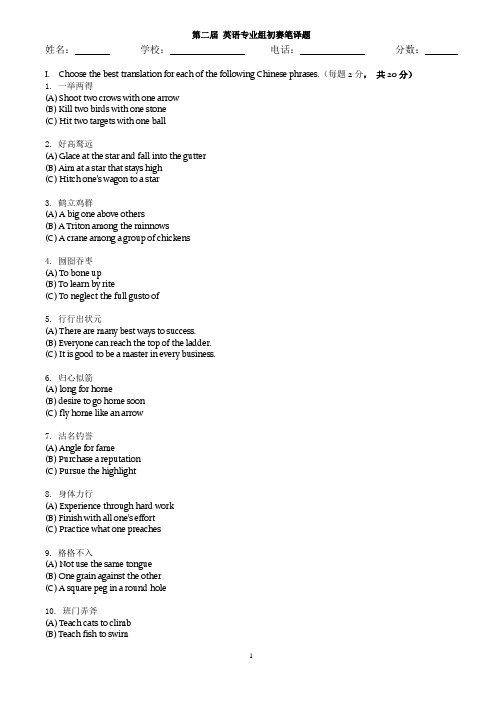
第二届英语专业组初赛笔译题姓名:学校:电话:分数:I. Choose the best translation for each of the following Chinese phrases.(每题2分,共20分)1.一举两得(A) Shoot two crows with one arrow(B) Kill two birds with one stone(C) Hit two targets with one ball2. 好高鹜远(A) Glace at the star and fall into the gutter(B) Aim at a star that stays high(C) Hitch one’s wagon to a star3.鹤立鸡群(A) A big one above others(B) A Triton among the minnows(C) A crane among a group of chickens4.囫囵吞枣(A) To bone up(B) To learn by rite(C) To neglect the full gusto of5.行行出状元(A) There are many best ways to success.(B) Everyone can reach the top of the ladder.(C) It is good to be a master in every business.6.归心似箭(A) long for home(B) desire to go home soon(C) fly home like an arrow7.沽名钓誉(A) Angle for fame(B) Purchase a reputation(C) Pursue the highlight8.身体力行(A) Experience through hard work(B) Finish with all one’s effort(C) Practice what one preaches9. 格格不入(A) Not use the same tongue(B) One grain against the other(C) A square peg in a round hole10. 班门弄斧(A) Teach cats to climb(B) Teach fish to swim(C) Teach one’s mother to cookII. This part consists of ten Chinese sentences, each followed by three different versions marked A,B and C. Choose the one which gets closest to the original. (每题2.5分,共25分)11.一切都是没有结局的开始,一切都是稍纵即逝的追寻。
方重翻译奖历届获奖作品汇编-上海外国语大学英语学院

目录※首届方重翻译奖英译中原文 (3)一等奖作品 (6)二等奖作品 (9)二等奖作品 (15)※首届方重翻译奖中译英原文 (18)一等奖作品 (20)二等奖作品 (23)二等奖作品 (26)※第二届方重翻译奖英译中原文 (29)一等奖作品 (33)二等奖作品 (37)二等奖作品 (41)※第二届方重翻译奖中译英原文 (44)一等奖作品 (46)二等奖作品 (49)二等奖作品 (53)※首届方重翻译奖英译中原文Writing and Winningby Adam GopnikNgugi wa Th iong’o? Juan Goytisolo? Adonis? Over the past several weeks, some version of this list was muttered, usually to a silent spouse in the middle of the night, by insomniac writers contemplating another Nobel Prize about to go where it shouldn’t; i.e., to some one other than themselves. (Not that winning puts out the competitive fires. Saul Bellow, who won the Nobel for literature in 1976, was said to have grown wistful every October after that, because you can win it only once.) Nor is the muttering restricted to the papabili who make the short list; pretty much every living writer with a word processor thinks that he or she has a shot at winning. (Edmund Wilson reports that our own James Thurber longed for it to go, just once, to a humorist; predictably, he never got anywhere near the podium.)When this year’s prize was announced, last Thursday, it went to a writer who, if not a North American (again), is at least familiar to North Americans: the Peruvian novelist and man of letters Mario Vargas Llosa. So all hail Vargas Llosa, whom even his noisier left-wing critics have to regard as exactly the kind of writer the prize ought to go to: one with a host of well-regarded novels (“The Time of the Hero,” “Conversation in the Cathedral,” the screen-adapted “Aunt Juli a and the Scriptwriter,” “The Feast of the Goat”) and a sense of social responsibility (he ran seriously for, and lost badly, the Presidency of Peru), not to mention a lively personal life that includes once punching out another future laureate with an equally impressive triple-barrelled moniker, Gabriel García Márquez, reportedly over something to do with Mrs. Vargas Llosa. The Nobel thus not only crowns a career but provides the basis for a fine future Javier Bardem/Antonio Banderas movie. (“The only thin g they cared for more than Latin American epic fiction was . . . the honor of a woman.”)What this year’s prize really shows is that prizes, like people, have a DNA of their own. The Nobel Prize in Literature would have been more illuminatingly named not after Dynamite Alfred but after his close friend, greatest hero, and ideal writer, Victor Hugo, with whom he shared time in Paris and the friendship of the great salon-keeper Juliette Adam-Lamber. (Hugo once called Nobel the “richest vagabond in Europe,” w ith an eye to his wanderings.) Hugo was not quite a writer-artist in the manner that we associate with Flaubert and James, but he was the big moral writer of his time—a writer who intervened in the world, rowing in and riding the tides of reform. Seen as winners of the Victor Hugo prize, all the Nobel choices make some sense. Even a reticent lyricist like Szymborska or a dyspeptic traveller like Naipaul or writers too readily elbowed aside, like Pearl Buck and Sinclair Lewis, have a neatly delineated social view and a will to engage in the world’s work, an urge to report as much as to invent, whereas the unlaurelled, on the whole, tend to be more writers of the sentence-and-its-structure than of the world-and-its-woes. Perhaps not coincidentally, one of Varg as Llosa’s most recent books, “The Temptation of the Impossible,” is a study of Hugo’s “Les Misérables.”Last week also revealed that, however much we may discount the Nobel Prize, we still prize it. No matter how many times the worthy losers console themselves with their fellows—who wouldn’t rather be in the company of Proust, Auden, and Nabokov than of Erik Axel Karlfeldt and Henrik Pontoppidan?—we’d all still take the meatball if the Swedes would only offer it. You would have thought that the second-rate nature of some prize-winners would have produced a general degradation of the prize. If you give the Oscar to the likes of “Ordinary People” and “Chariots of Fire” often enough, won’t your prize be worth a bit less? Just the opposite: the more often an established prize goes to a dubious candidate the more valued it becomes.A kind of Devil’s Theory of Value seems to rule: A prize is always assumed to be shining, intact; it is those wrong prize-winners who are discredited by it. When we win it, the world will be restored to its proper balance. We blame the winners, not the prize, for the errors. Why should this be so? The bleakest theory is that the purpose of a literary prize is not to reward the deserving but toprovoke conversation and controversy within a community. When a prize goes to a Brodsky or a Milosz or a Walcott, the way that once in a blue moon a decent apartment goes to a newcomer in Manhattan, it keeps the game alive.The real reason that literary prizes are so prized, however, is that prize-giving is intrinsic to the purposes of poetry. From birds to bards, the urge to outdo the other singer is what makes us sing. Since the first strum on the oldest lyre, literature has been about competition and the possibility of recognition. Pindar, the father of lyric poetry, took as his chief subject the winning of games, and the spirit of the end-zone dance has been with us ever since. Horace satirized everything except his own appetite for fame. Milton mourned Lycidas not because he stood beyond all prizes but because he died before the prizes could be won. The subtlest souls still show up in Stockholm to make the speech. Fame, honor, the laurel, and the bays, this more even than getting back at the girls, or the boys, who left you for another—the writer’s other great motivation—is the poetic passion. (Even the idea of posthumous fame is merely the thought of a prize given while we are sleeping, and have left our muttering to others.)In the past decade, one of the enduring axioms of literature has been finally, jarringly broken, and that is Dr. Johnson’s “No man but a blockhead ever wrote, except for money.” Now the Internet overflows with those who write for glory and a name alone—and not all of them are blockheads. But the opposing axiom, that people write for prizes, survives. Why write? Because you may someday win a prize given by Scandinavians of unknown names and demonstrably uncertain taste? Apparently so. At least, so the writers’ spouses think, and, sleepless in September, they should know.一等奖作品得奖与写作■英语学院2009级翻译3班周新迪是恩古吉·瓦·提安哥1?胡安·戈伊蒂索洛2?还是阿多尼斯3?在过去的几周里,失眠的作家们深更半夜地向他们熟睡的另一半嘀咕这个名单的某种版本,琢磨着又一个诺贝尔奖要去不该去的地方,也就是说花落别家而不是被自己收入囊中。
英语世界翻译大赛原文
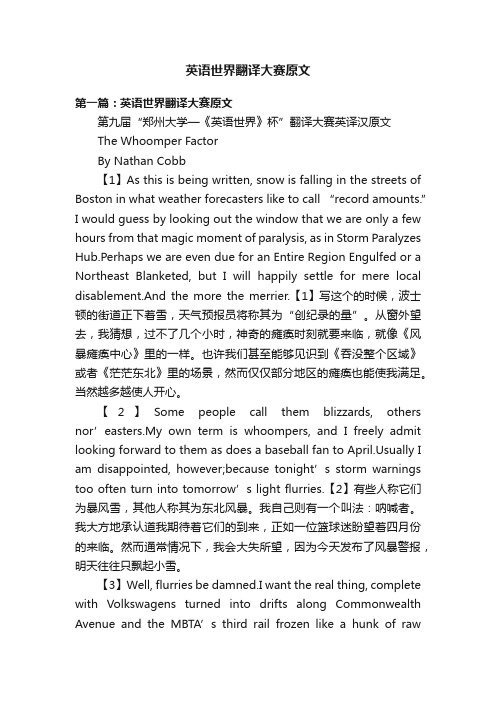
英语世界翻译大赛原文第一篇:英语世界翻译大赛原文第九届“郑州大学—《英语世界》杯”翻译大赛英译汉原文The Whoomper FactorBy Nathan Cobb【1】As this is being written, snow is falling in the streets of Boston in what weather forecasters like to call “record amounts.”I would guess by looking out the window that we are only a few hours from that magic moment of paralysis, as in Storm Paralyzes Hub.Perhaps we are even due for an Entire Region Engulfed or a Northeast Blanketed, but I will happily settle for mere local disablement.And the more the merrier.【1】写这个的时候,波士顿的街道正下着雪,天气预报员将称其为“创纪录的量”。
从窗外望去,我猜想,过不了几个小时,神奇的瘫痪时刻就要来临,就像《风暴瘫痪中心》里的一样。
也许我们甚至能够见识到《吞没整个区域》或者《茫茫东北》里的场景,然而仅仅部分地区的瘫痪也能使我满足。
当然越多越使人开心。
【2】Some people call them blizzards, others nor’easters.My own term is whoompers, and I freely admit looking forward to them as does a baseball fan to ually I am disappointed, however;because tonight’s storm warnings too often turn into tomorrow’s light flurries.【2】有些人称它们为暴风雪,其他人称其为东北风暴。
英语翻译资格考试:教育部二级英语口译真题
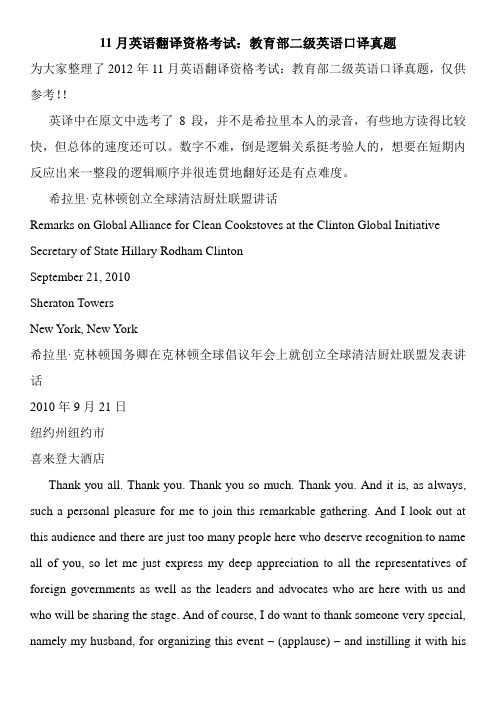
11月英语翻译资格考试:教育部二级英语口译真题为大家整理了2012年11月英语翻译资格考试:教育部二级英语口译真题,仅供参考!!英译中在原文中选考了8段,并不是希拉里本人的录音,有些地方读得比较快,但总体的速度还可以。
数字不难,倒是逻辑关系挺考验人的,想要在短期内反应出来一整段的逻辑顺序并很连贯地翻好还是有点难度。
希拉里·克林顿创立全球清洁厨灶联盟讲话Remarks on Global Alliance for Clean Cookstoves at the Clinton Global Initiative Secretary of State Hillary Rodham ClintonSeptember 21, 2010Sheraton TowersNew York, New York希拉里·克林顿国务卿在克林顿全球倡议年会上就创立全球清洁厨灶联盟发表讲话2010年9月21日纽约州纽约市喜来登大酒店Thank you all. Thank you. Thank you so much. Thank you. And it is, as always, such a personal pleasure for me to join this remarkable gathering. And I look out at this audience and there are just too many people here who deserve recognition to name all of you, so let me just express my deep appreciation to all the representatives of foreign governments as well as the leaders and advocates who are here with us and who will be sharing the stage. And of course, I do want to thank someone very special, namely my husband, for organizing this event – (applause) – and instilling it with hisvery special spirit of activism, innovation, and commitment that is contagious.谢谢大家,谢谢,非常感谢,谢谢。
- 1、下载文档前请自行甄别文档内容的完整性,平台不提供额外的编辑、内容补充、找答案等附加服务。
- 2、"仅部分预览"的文档,不可在线预览部分如存在完整性等问题,可反馈申请退款(可完整预览的文档不适用该条件!)。
- 3、如文档侵犯您的权益,请联系客服反馈,我们会尽快为您处理(人工客服工作时间:9:00-18:30)。
第二届中西部外语翻译大赛(陕西赛区)翻译原文
评分
姓名学校(院、系、班)手机
中国已有5000年的文明发展史,中国文化是世界最古老的文化之一,而且是世界上唯一的长期延续没有中断的文化。
中国文化之所以具有如此强大的生命力,主要由其本身所固有的内在结构和基本素质所决定。
中国文化的结构是“多元一体”的,“多元”是指它早期由多种文化融合而成,后来又接纳了各少数民族文化,且对外来文化具有极强的包容性,从而形成了一种“多元”文化兼容并包的格局;“一体”指多元文化熔铸为一个整体,形成了有着共同的价值观念和鲜明特色的中华民族文化。
中国文化“多元一体”的结构造就了它自信宽容的素质,中国文化以我为主,不断吸收外来文化,在吐故纳新中获得了生命的活力。
面临当今世界的挑战,饱经风霜的中国文化从容应对,在自我改造和改造世界中展示自己的文化魅力,并永葆青春。
科学就是探求真理。
在探求真理的过程中,人们对客观规律的认识要经过艰苦曲折的过程。
常常有这样的情形:由于研究的角度不同,掌握资料的差异,认识方法的不同,就会出现“横看成岭侧成峰,远近高低各不同”的情况,以至引起学术上的争论。
因此,有作为的科学工作者都把反对的意见看作对自己的莫大的帮助,把对自己的批评当作最珍贵的友谊。
正如歌德所说,“我们赞同的东西使我们处之泰然,我们反对的东西才使我们的思想获得丰产。
”这都是因为,赞同的意见未必正确,反对的意见未必错误。
退一步说,即使错误的反对意见,对自己的科学研究也是很有好处的。
科学研究的方法只是人类思维中必要的工作方式的表现,正是通过这种方式,人类对一切现象进行逻辑推理,并做出精确的解释。
科学家的思维活动与普通人的思维活动之间并无实质的区别,其区别有如面包师或者肉匠用普通磅秤称量他们的物品,而化学家则用天平和精确/细致分级的砝码来进行难度很大和复杂深入的分析一样。
并不是因为在前一种情况下的磅秤与后一种情况下的天平在构造原理或工作方式上有何不同,只是因为天平是更为精密的仪器,与磅秤比较起来,其称量结果自然要精确得多。
如果给你举一些非常熟悉的例子,或许你会理解得更清楚。
你会多次听说过科学家们是运用归纳法和演绎法工作,而且,在某种意义上,他们运用这些思维方式从自然界中总结出一些自然规则,然后运用特殊的技巧,在这些自然规则的基础上建立自己的理论。
